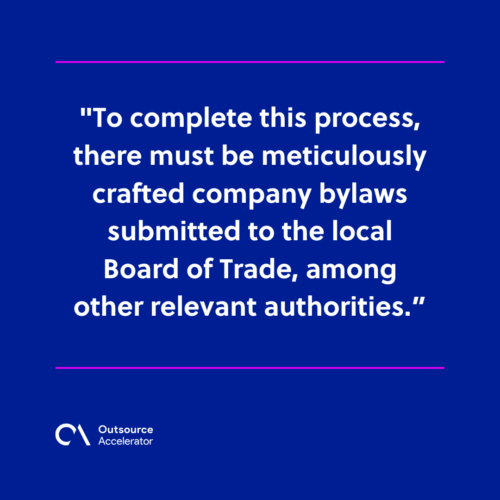How to start a corporation in Brazil

Starting a corporation in Brazil can be very challenging, especially when unfamiliar with the local rules and regulations.
Before embarking on a new exciting journey to starting a corporation in the country, it is important to note that Brazilian systems and processes could be complex and intricate.
Thankfully, in previous years, the country has taken steps towards becoming a more attractive destination for foreign business and investment.
Brazil: The giant of South America
As far as Latin America is concerned, Brazil is the largest country in the region. In fact, the country is home to the 9th largest economy in the world and the largest in Latin America.
A giant of mining, agriculture, and manufacturing, the country has much to offer those wishing to do business here.
The prominence of Brazil is derived from its continental dimensions, diversified natural resources, and huge consumer market. In the 2000s, the economy benefited from global growth and high commodity demand.
In 2008 such prosperity was threatened by the global financial crisis that Brazil managed only to contain partially.
Unfortunately, Brazil did not see this commodities boom as an opportunity to tackle important issues that have been challenging sustainable economic growth for decades but still maintained the same mediocre policies.
Despite this impediment, Brazil was able to rise economically. Surpassing the United Kingdom in 2011, Brazil now holds the position as the world’s sixth-largest economy.
Brazil’s Finance Ministry upped its expectation for 2023 economic growth to 3.2% from 2.5% in July, owing mostly to surprisingly robust activity in the second quarter of the year.

Even more impressive, their forecast shows the city of São Paulo to be the fifth wealthiest in the world by 2025.
Spurring Brazil’s growth is the recent privatization of state-owned industries, along with a focus on keeping inflation rates low and a boost in foreign trade and investment.
Brazil stands out as a complete bundle. Its government operates democratically, and ethnic and religious conflicts are minimal. Its exports encompass a wide range of products, and its people exude a welcoming and friendly demeanor.
Can a foreigner start a corporation in Brazil?
According to Brazilian law, foreigners can start a business in Brazil. The country allows 100% foreign ownership of incorporated local companies.
They may also sponsor visas for their overseas employees. Even then, you do not need to visit Brazil or be present to operate locally physically.
Brazilian law does not require more than one “quota holder” or member. However, depending on your business model, you may want more than one member.
Alternatively, the association can be registered using a joint stock company (“countersocial” in Portuguese) according to local regulations.
At least one Brazilian resident, as a quota holder or otherwise, must be responsible for managing Sociedade Limitada. The identities of quota holders are identified in meeting minutes or similar documents.
The annual meeting of quota holders must be supported by annual revenue. The minutes were made public when published in the Brazilian Labor Market.
How to start a corporation in Brazil
To register a business in Brazil, you will need to follow these essential steps:
1. Find the perfect location
Apart from the above, you must also look at aspects like how easy it is to access, distance away from your target market and other legal requirements that exist in the area.
This is a matter of crucial importance where the strategic location of your venture has to be guided by the country’s laws.
2. Obtain a local tax identification number
Every employer wishing to start a company must obtain a local tax identification number in any country, including Brazil.
Foreign business owners must be registered in the Taxpayers Registry of the Brazilian Federal Tax Office. To do this, they must elect a Brazilian resident with the right to represent them before the organization and manage their assets in Brazil.
The process can be initiated online but must be completed within 90 days of the initial submission of the company’s beneficial owner (UBO) information and supporting documentation.
3. Designate a legal representative.
One should find a competent attorney to go through Brazil’s bureaucratic environment. A legal representative will possess the necessary qualifications and experience.
4. Create the company’s bylaws
Work with an experienced lawyer when it comes to drafting your company’s bylaws.
The legal representative will explain in detail concerning issues such as the nature or type of business, structure, and internal procedures related to business in Brazil.
5. Register your business
To complete this process, there must be meticulously crafted company bylaws submitted to the local Board of Trade, among other relevant authorities.
From here, the Brazilian dynamic market will anonymously begin recognizing your business legally.
Upon registration, also consider the following factors:
- The entity’s formal name
- The company’s address Information on the shareholders
- Capital information Information on the business activities that will be carried out
- Information about the company’s administration.

6. Create a corporate bank account
Once you’re done with the official registration, the opportunity to open a corporate bank account tailored to suit your unique business needs must be seized.
To fulfill this process, seek counsel from your esteemed legal representative who will help you select an optimal banking provider.
Documents required to open a bank account are (among others, each bank may specify its own documents): relevant UBO certificate)
- Registration documents for Brazilian entities
- Taxpayer identification information for Brazilian entities
- Financial documents for Brazilian entities
- Documents of the private sector of the Brazilian workforce.
7. Register the paid capital
As a business establishment owner, you are responsible for registering the company’s paid-in capital with the Central Bank, expertly handling complex administrative matters, and ensuring precise coordination of the financial structure.
Your focus on regulatory compliance should be a procedural necessity and a strategic step to strengthen the company’s readiness to operate smoothly within the Brazilian economic structure.
8. Register a business in Brazil by depositing the initial capital
Your corporation must successfully complete its formal registration process in Brazil by depositing capital into the corporate financial institution.
This significant milestone symbolizes the enterprise’s inception, commencing a hopeful voyage towards advancement, affluence, and enduring connections with the mesmerizing nation.
In addition, once your business has been established, you need to report to the Central Bank of Brazil occasionally.
Reporting can be done electronically on the disclosure of capital and/or specific financial information regarding their foreign members per certain rules established by the central bank.
Final considerations when you start a corporation in Brazil
In case you want to start a corporation in Brazil, there are some important things you should be aware of about the process. For example, branches are not the same as subsidiaries in Brazil. Opening a subsidiary is easier compared to opening a branch.
Brazil’s law allows any foreign company to be a partner, investor, or shareholder of a Brazilian company, thereby making it its subsidiary. The Brazilian business is also governed by law and has equal rights and obligations as any other company.
On the contrary, opening a branch in Brazil is complex and requires authorization from the Ministry of Development, Industry and Foreign Trade of Brazil.
When forming your Company in Brazil, you must understand the difference between these two models and choose which suits you best.

One of the important matters that should be taken into consideration is whether you are qualified to open a business in the said country. Here are the qualifications:
- Brazilian or foreign over eighteen years old who is found under the free administration of his/her person or property. A foreigner must live here permanently or designate an agent to act on behalf of them.
- Emancipated minor or having reached majority
By concession of the parents, or one of them in the absence of another, if the minor is sixteen years old (Porto Alegre). The grant will consist of a public instrument, which must be registered with the Civil Registry of Natural Persons and filed with the Commercial Registry;
By judgment of the judge, who must also be registered with the Civil Registry of Natural Persons;
For marriage;
For effective public employment (civil servant occupying a position in a direct administration body, autarchy or federal, state or municipal public foundation).
Because there are civil or commercial establishments or because there is any kind of employment relationship when dependent upon them, provided that minors have already reached 16 years of age with their own economy.







 Independent
Independent




